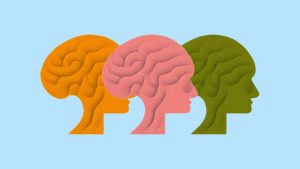Being emotionally healthy is just as important as being physically healthy: the two are closely connected at various levels. To ensure that we lead a fulfilling life, we have to take that extra step.
“Emotions change the way we see the world”. This is a quote by Paul Ekman and it has been interpreted in so many different ways in so many movies and books. Emotion is a powerful word and dictates a huge part of our lives, but it is surprising to see that a minuscule amount of people know about emotional health and even a smaller number work towards achieving it.
In the book “Chaos of Standing Still” by Jessica Brody, the hero, Ryn, is dealing with the insurmountable loss of her childhood best friend, but rather than facing her grief, sadness and anger, she just buries these feelings under a rock. She doesn’t cry for a year and cuts everyone out of her life, while just clinging to the last memento of her best friend (an unread message). When she finally lets go and embraces that grief and cries, she starts seeing things clearly. She finally feels happy.
From the above instance, one thing is very obvious: in order to feel happy, it is also very important to feel sad. All emotions that we experience are equally important and it is essential to stay in tune with them.
For starters, it is important to understand that mental health and emotional health are not the same. Emotions come under the broad umbrella of mental health. Emotional health is coping with both positive and negative emotions, which includes us being aware of them.
What are the different types of emotions?

According to Paul Ekman, who developed the widely accepted theory of basic emotions and their expression, there are six basic emotions:
- Sadness: an emotional state characterised by the feeling of disappointment, grief and hopelessness.
- Anger: an emotion where we feel frustrated and hostile.
- Happiness: an agreeable or positive emotion that creates a feeling of joy, contentment and happiness.
- Fear: a primal emotional state that induces the fight or flight response.
- Surprise: a brief positive or negative experience followed by an unexpected emotion.
- Disgust: a strong emotion induced by repulsion.
These are the basic emotions, but like colours, they mix and match to create complex ones such as “hate”, which is a combination of anger, disgust and fear. Other emotions could be embarrassment and love. These emotions have varied expressions and are hard to recognise.
What is emotional health?
The most important question here is why do we need it? Emotional well-being is essential for contentment and success in professional and personal life. Just like in the movie “Work it” our protagonist, Quinn, thought that achieving an Ivy League College would make her happy. Finally, she realises that happiness will not come if she goes to Duke University, but being happy will help her be successful because when we are content, we work better, which in turn makes us successful.
Emotional health does not mean that we are always happy or free from negative emotions. It is about dealing effectively with both kinds of emotions to lead a healthy life. To do this we need to be consciously aware and receptive to all our emotions.
How can you improve your emotional health?
The strategies/tips below may seem easy, but keep in mind what seems easy to do is also easy not to do. So, keep in mind to start with one change at a time and stick with it and you will see phenomenal effects in your life.

1. Regulate your emotions
In situations of stress, it is very easy for emotions to get the best of us and when we react harshly, it doesn’t do anything, except escalate the situation. But learning healthy and constructive coping strategies help us get in tune with our temper and control it.
Some coping strategies are:
- Meditation or practising mindfulness daily
- Journaling (writing down our thoughts and feelings to understand them more clearly) and introspecting on our thoughts and actions
- Listening to music
- Talking to a therapist when we are too troubled

2. Exercise regularly
Exercise helps release feel-good chemicals like endorphins in the body, which in turn, improves our mood and makes us more relaxed. It flushes out toxins and reduces the levels of the fear hormone in our body.
Studies have shown that exercise improves self-esteem and reduces depressed mood and anxiety.

3. Enhance your relationships
Our bond with the people is indispensable and spending time to foster these connections is very important either personally or on the phone. Our family and close relationships become our backbone in times of distress and they give us a sense of safety. This is essential to achieve good emotional health.
4. Get quality sleep

Sacrificing sleep is the worst thing we can do to our physical and emotional health. The lack of sleep makes us view things negatively, impacts our thoughts, decisions, relationships and wreaks havoc on our confidence and emotional health. It makes us vulnerable to stress, anxiety, and depression.
Studies have also shown that the lack of sleep leads to weight gain, memory issues and leaves us at the risk of developing mood disorders.
Make sure you’re being consistent with your sleep and waking times and optimise your bedroom environment so that you’re getting enough rest.
These tips should certainly help, however, if you feel you need additional support, consult your doctor for further advice on how and where to find help.



















